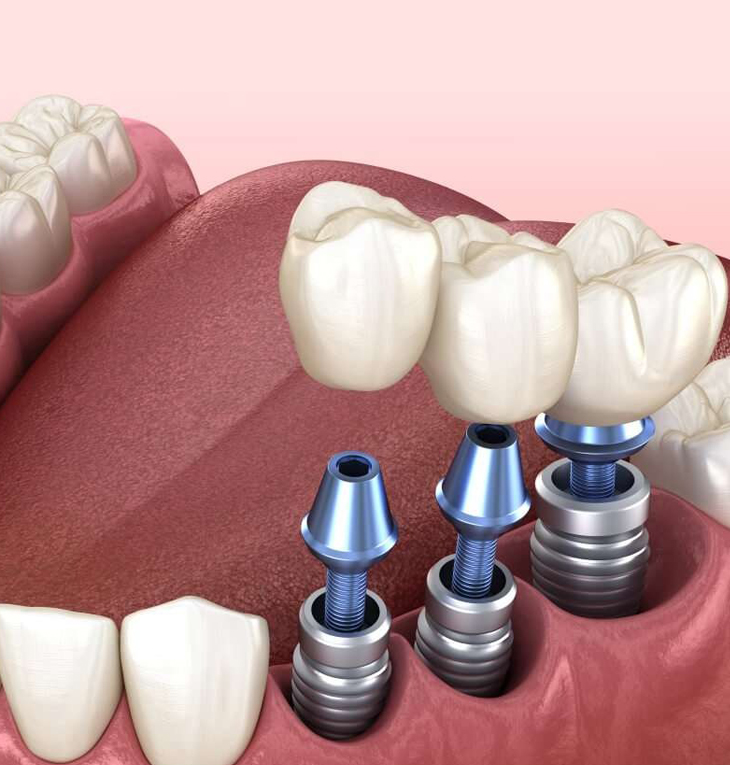
Improve Your Smile with Dental Implants
Dental implants in Edmonton are made of titanium and are a practical way to replace one or more missing teeth and restore the function and appearance of your smile. Implants are also a great option for patients that struggle with loose or poor-fitting dentures. Implant-supported dentures, sometimes known as anchored dentures, provide more stable support and eliminate gaps and shifting.
Unlike fillings or crowns that are bonded to the tooth, dental implants are placed into the jawbone. Like the root of a natural tooth, implants bond directly to the jaw bone. After administering a local anesthetic, the doctor will gently place the implant into the jaw bone below the gum line. The jawbone must then heal for 3-6 months, after which a permanent artificial tooth (implant crown) is created to fit on top of the implant.
What Are Dental Implants?
What Conditions Can Dental Implants Fix?
- Missing Teeth: Dental implants are an ideal replacement for one or more missing teeth, providing a permanent and natural-looking solution.
- Tooth Decay: When a tooth is severely decayed beyond repair, an implant can be a reliable alternative after extraction, preventing further damage and maintaining oral health.
- Broken or Damaged Teeth: Implants can replace teeth that are broken or damaged due to trauma or wear, ensuring a stable and durable restoration.
- Jawbone Deterioration: By stimulating the jawbone, dental implants prevent bone loss that typically occurs after tooth loss, maintaining the structural integrity of the jaw.
- Shifting Teeth: Missing teeth can cause adjacent teeth to shift and create misalignment. Implants fill the gap and keep the surrounding teeth in their proper positions.
- Speech and Chewing Problems: Dental implants restore full functionality, allowing for proper speech and effective chewing, which might be compromised by missing or damaged teeth.
- Unstable Dentures: For those struggling with ill-fitting dentures, dental implants can anchor them securely, offering increased comfort and stability.
Why Should You Choose Dental Implants in Edmonton, AB?
- Natural Appearance: Implants look and feel like your natural teeth, enhancing your smile's aesthetics.
- Improved Functionality: Enjoy restored chewing and speaking abilities without the discomfort of traditional dentures.
- Durability: With proper care, dental implants can last a lifetime, making them a cost-effective solution.
- Bone Preservation: Implants help maintain jawbone density, preventing the sunken appearance associated with missing teeth.
- Oral Health: Unlike bridges, implants do not require alteration of adjacent teeth, preserving your natural tooth structure.
What Are The Different Types of Dental Implants?
- Single Tooth Implants: Ideal for replacing a single missing tooth, these implants provide a standalone solution that integrates seamlessly with your existing teeth.
- Multiple Tooth Implants: For patients missing several teeth, multiple implants can support a bridge, offering stability and functionality without compromising neighboring teeth.
- All-on-4/All-on-6 Implants: This technique uses four or six strategically placed implants to support a full arch of replacement teeth, providing a fixed and secure solution for patients missing all their teeth.
- Implant-Supported Dentures: These dentures are anchored to implants, offering improved stability and comfort compared to traditional removable dentures.
The Dental Implant Procedure at Fresh Dental Edmonton
- Initial Consultation: Our dental implant process begins with a thorough consultation where we assess your oral health, discuss your goals, and create a personalized treatment plan.
- Surgical Placement: Using advanced imaging and precise surgical techniques, our implant dentist in Edmonton, AB places the implants into the jawbone. This procedure is performed under local anesthesia or sedation for your comfort.
- Healing and Osseointegration: Over the next few months, the implants fuse with the jawbone in a process called osseointegration, providing a solid foundation for the replacement teeth.
- Abutment Placement: Once the implants are securely integrated, abutments are attached to the implants. These act as connectors between the implants and the final restorations.
- Crown Placement: Finally, custom-made crowns, bridges, or dentures are placed onto the abutments, completing your new smile.
How To Care For Your Dental Implants?
- Oral Hygiene: Brush and floss regularly to keep the implant area clean and free from plaque buildup.
- Regular Check-ups: Schedule routine dental visits for professional cleanings and examinations to monitor the health of your implants.
- Avoid Hard Foods: Refrain from chewing on hard foods and objects that could damage the implants or surrounding teeth.
- Mouthguard: If you grind or clench your teeth at night, wear a custom mouthguard to protect your implants and natural teeth.

